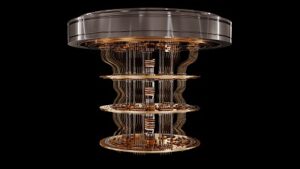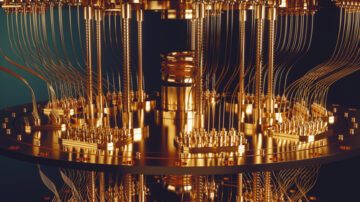Intel’s Tunnel Falls quantum 12-qubit chip
Intel has announced the release of its “Tunnel Falls” quantum research chip, a 12-qubit silicon chip that the company is making available to the quantum research community.
Intel also said it is collaborating with the Laboratory for Physical Sciences (LPS) at the University of Maryland, College Park’s Qubit Collaboratory (LQC), a national-level Quantum Information Sciences (QIS) Research Center, to advance quantum computing research.
Tunnel Falls is fabricated on 300-millimeter wafers in the D1 fabrication facility, the 12-qubit device leverages Intel’s transistor industrial fabrication capabilities, such as extreme ultraviolet lithography (EUV) and gate and contact processing techniques, according to the company. In silicon spin qubits, information (the 0/1) is encoded in the spin (up/down) of a single electron. Each qubit device is essentially a single electron transistor, which allows Intel to fabricate it using a similar flow to that used in a standard complementary metal oxide semiconductor (CMOS) logic processing line.
Intel believes silicon spin qubits are superior to other qubit technologies because of their synergy with leading-edge transistors. Being the size of a transistor, they are up to 1 million times smaller than other qubit types measuring approximately 50 nanometers square, potentially allowing for efficient scaling. According to Nature Electronics, “Silicon may be the platform with the greatest potential to deliver scaled-up quantum computing.”
At the same time, utilizing advanced CMOS fabrication lines allows Intel to use process control techniques to enable yield and performance, according to the company. For example, the Tunnel Falls 12-qubit device has a 95 percent yield rate across the wafer and voltage uniformity, similar to a CMOS logic process, and each wafer provides more than 24,000 quantum dot devices. These 12-dot chips can form four to 12 qubits that can be isolated and used in operations simultaneously depending on how the university or lab operates its systems.
![]() Intel said it intends to continously work to improve the performance of Tunnel Falls and integrate it into its quantum stack with the Intel Quantum Software Development Kit (SDK). In addition, Intel is developing its next-generation quantum chip based on Tunnel Falls, expected to be released in next year. The company also plans to partner with additional research institutions globally to build the quantum ecosystem.
Intel said it intends to continously work to improve the performance of Tunnel Falls and integrate it into its quantum stack with the Intel Quantum Software Development Kit (SDK). In addition, Intel is developing its next-generation quantum chip based on Tunnel Falls, expected to be released in next year. The company also plans to partner with additional research institutions globally to build the quantum ecosystem.
“Tunnel Falls is Intel’s most advanced silicon spin qubit chip to date and draws upon the company’s decades of transistor design and manufacturing expertise,” said Jim Clarke, director of Quantum Hardware, Intel. “The release of the new chip is the next step in Intel’s long-term strategy to build a full-stack commercial quantum computing system. While there are still fundamental questions and challenges that must be solved along the path to a fault-tolerant quantum computer, the academic community can now explore this technology and accelerate research development.”
Intel said the chip’s availability allows researchers to begin on such experiments as learning about the fundamentals of qubits and quantum dots,and developing techniques for working with devices with multiple qubits.
Intel said it is collaborating with LQC as part of the Qubits for Computing Foundry (QCF) program through the U.S. Army Research Office to provide Intel’s new quantum chip to research laboratories. The collaboration is designed to help democratize silicon spin qubits by enabling researchers to gain hands-on experience working with scaled arrays of these qubits, according to Intel.
Jim Clarke, Director, Quantum Hardware Research Group, Intel
“The initiative aims to strengthen workforce development, open the doors to new quantum research and grow the overall quantum ecosystem,” the company said. The first quantum labs to participate in the program include LPS, Sandia National Laboratories, the University of Rochester and the University of Wisconsin-Madison. LQC will work alongside Intel to make Tunnel Falls available to additional universities and research labs. The information gathered from these experiments will be shared with the community to advance quantum research and to help Intel improve qubit performance and scalability.
“Sandia National Laboratories is excited to be a recipient of the Tunnel Falls chip,” said Dr. Dwight Luhman, distinguished member of technical staff at Sandia. “The device is a flexible platform enabling quantum researchers at Sandia to directly compare different qubit encodings and develop new qubit operation modes, which was not possible for us previously. This level of sophistication allows us to innovate novel quantum operations and algorithms in the multi-qubit regime and accelerate our learning rate in siliconbased quantum systems. The anticipated reliability of Tunnel Falls will also allow Sandia to rapidly onboard and train new staff working in silicon qubit technologies.”
Mark A. Eriksson, department chair and John Bardeen Professor of Physics, Department of Physics, University of Wisconsin-Madison, said, “UW-Madison researchers, with two decades of investment in the development of silicon qubits, are very excited to partner in the launch of the LQC. The opportunity for students to work with industrial devices, which benefit from Intel’s microelectronics expertise and infrastructure, opens important opportunities both for technical advances and for education and workforce development.”
- SEO Powered Content & PR Distribution. Get Amplified Today.
- EVM Finance. Unified Interface for Decentralized Finance. Access Here.
- Quantum Media Group. IR/PR Amplified. Access Here.
- PlatoAiStream. Web3 Data Intelligence. Knowledge Amplified. Access Here.
- Source: https://insidehpc.com/2023/06/intel-quantum-tunnel-falls-silicon-spin-chip-available-to-researchers/
- :has
- :is
- :not
- $UP
- 000
- 1
- 12
- 24
- 50
- a
- About
- academic
- accelerate
- According
- across
- addition
- Additional
- advance
- advanced
- advances
- aims
- algorithms
- allow
- Allowing
- allows
- along
- alongside
- also
- analysis
- and
- and infrastructure
- announced
- Anticipated
- approximately
- ARE
- Army
- AS
- At
- availability
- available
- based
- BE
- because
- begin
- being
- believes
- benefit
- both
- build
- by
- CAN
- capabilities
- Center
- Chair
- challenges
- chip
- Chips
- collaborating
- collaboration
- College
- commercial
- community
- company
- Company’s
- compare
- complementary
- computer
- computing
- computing research
- contact
- control
- Date
- decades
- deliver
- democratize
- Department
- Depending
- Design
- designed
- develop
- developing
- Development
- device
- Devices
- different
- directly
- Director
- doors
- DOT
- dr
- draws
- each
- ecosystem
- Education
- efficient
- Electronics
- enable
- enabling
- essentially
- example
- excited
- expected
- experience
- experiments
- expertise
- explore
- extreme
- Facility
- Falls
- First
- flexible
- flow
- For
- form
- Foundry
- four
- from
- fundamental
- Fundamentals
- Gain
- gathered
- Globally
- greatest
- Group
- Grow
- hands-on
- Hardware
- help
- high-performance
- How
- HTTPS
- important
- improve
- in
- include
- industrial
- information
- Infrastructure
- Initiative
- innovate
- institutions
- integrate
- Intel
- intel quantum
- intends
- into
- investment
- isolated
- IT
- ITS
- Jim
- John
- jpg
- Kit (SDK)
- lab
- laboratory
- Labs
- launch
- learning
- Level
- leverages
- Line
- lines
- logic
- long-term
- LPs
- make
- Making
- manufacturing
- Maryland
- max-width
- May..
- measuring
- member
- metal
- million
- modes
- more
- most
- multiple
- must
- National
- Nature
- New
- new chip
- news
- next
- next-generation
- novel
- now
- of
- Office
- on
- Onboard
- open
- opens
- operates
- operation
- Operations
- opportunities
- Opportunity
- or
- Other
- our
- overall
- part
- participate
- partner
- path
- percent
- performance
- physical
- Physical Sciences
- Physics
- plans
- platform
- plato
- Plato Data Intelligence
- PlatoData
- possible
- potential
- potentially
- previously
- process
- processing
- Professor
- Program
- provide
- provides
- Quantum
- Quantum Computer
- quantum computing
- Quantum dot
- Quantum dots
- quantum information
- quantum research
- quantum software
- quantum systems
- Qubit
- qubits
- Questions
- rapidly
- Rate
- regime
- release
- released
- reliability
- research
- Research Institutions
- researchers
- s
- Said
- same
- Scalability
- scaling
- SCIENCES
- sdk
- semiconductor
- shared
- Silicon
- silicon qubit
- silicon qubits
- similar
- simultaneously
- single
- Size
- smaller
- Software
- software development
- software development kit
- Spin
- spin qubits
- square
- stack
- Staff
- standard
- Step
- Still
- Strategy
- Strengthen
- Students
- such
- superior
- synergy
- system
- Systems
- Technical
- techniques
- Technologies
- Technology
- than
- that
- The
- the information
- their
- There.
- These
- they
- this
- Through
- time
- times
- to
- Train
- two
- types
- u.s.
- Universities
- university
- upon
- us
- use
- used
- using
- Utilizing
- very
- Voltage
- was
- which
- while
- will
- with
- Work
- Workforce
- Workforce Development
- working
- year
- Yield
- zephyrnet













